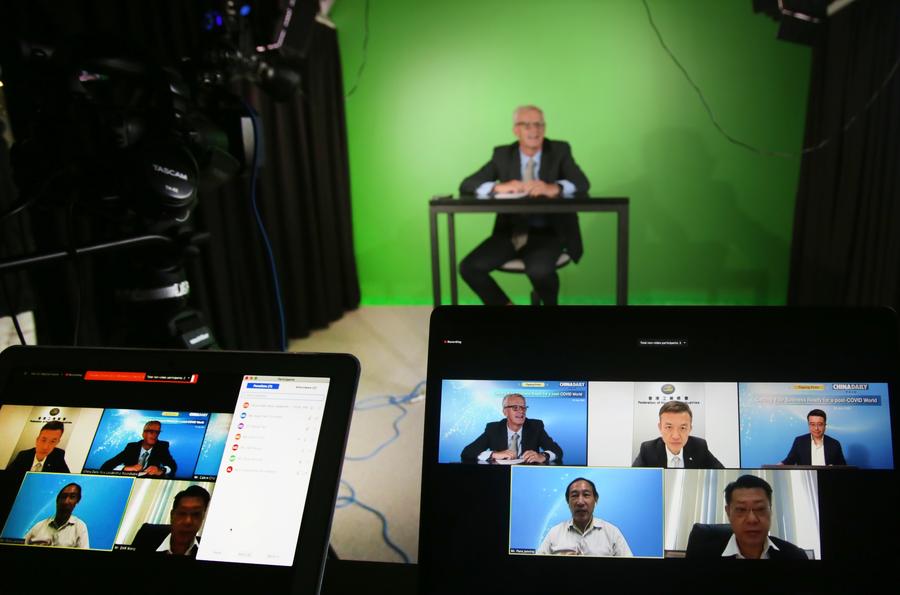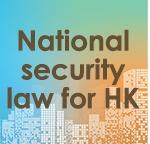 Moderator D.J. Clark, a multimedia reporter at China Daily, and experts talk at a China Daily webinar themed “Getting your business ready for a post-COVID world” on Wednesday. PARKER ZHENG / CHINA DAILY
Moderator D.J. Clark, a multimedia reporter at China Daily, and experts talk at a China Daily webinar themed “Getting your business ready for a post-COVID world” on Wednesday. PARKER ZHENG / CHINA DAILY
As the world wrestles with the fallout from the coronavirus crisis, businesses should diversify into more markets and adapt their fundamental models to fit into the new norm more proactively and ride out the storm, business leaders and experts told the China Daily Asia Leadership Roundtable in Hong Kong on Wednesday.
Daniel Yip, chairman of the Federation of Hong Kong Industries, said Hong Kong has been experiencing a “perfect storm” from a pandemic of an unprecedented scale, as well as the escalating trade skirmish between the world’s two largest economies.
But, such a crisis can also be seen as a path to reinvention and market diversification, he stressed.
“For years, Hong Kong’s economy has been known for its over-reliance on pillar sectors, such as finance and logistics. However, a mature economy should have different aspects of a flourishing business,” he said.
ALSO READ: HK recession eases slightly as GDP contracts 9% in Q2
For years, Hong Kong’s economy has been known for its over-reliance on pillar sectors, such as finance and logistics. However, a mature economy should have different aspects of a flourishing business.
Daniel Yip, Chairman of Federation of Hong Kong Industries
The entrepreneur believes the crisis offers a good opportunity for Hong Kong, which is currently battling its most severe wave of COVID-19 infections since the pandemic began, to take a sober look at overdue industrial reinvention.
“Our initiative is to reinvent industries. We want to make more people realize that industry is not dying in Hong Kong,” said Yip.
He said many high value-added manufacturing processes, such as marketing, intellectual property creation and production process engineering, can be done in the special administrative region.
“Then our final manufacturing place can be set on the Chinese mainland, in ASEAN (the Association of Southeast Asian Nations) or in Hong Kong. These are the main things behind reinventing Hong Kong industries.”
READ MORE: E-commerce techniques ‘key to manufacturers’ survival’
In Yip’s view, what marks the latest flashpoint in the lingering Sino-US political rhetoric is US President Donald Trump’s earlier decision to strip Hong Kong of its special treatment and impose sanctions on individuals and entities deemed to be eroding the city’s autonomy, in the wake of the Hong Kong National Security Law.
Citing the latest survey carried out by the Federation of Hong Kong Industries, he said 80 percent of the members polled believe that the effect of the United States sanctions on Hong Kong remains small or even negligible.
This is mainly due to the fact that 99 percent of the SAR’s total exports to the US are, in fact, re-exports from the Chinese mainland, and there’s a growing tendency for the US to tighten its grip on the shipment of crucial technology to Hong Kong in the past four years, with total exports of high-tech products to the SAR having plunged by 75 percent, he explained.
“Nevertheless, there’s a big risk for local manufacturers to rely solely on the traditional US market,” Yip warned. The virus and the geopolitical storm speak volumes that the significance of “regional diversification” cannot be overestimated, he said.
As the mainland leads the pack in restarting its economy and getting factories humming again, Yip believes its economy has what it takes to stage a comeback in the next two to three months.
“Hong Kong manufacturers should take the opportunity to explore the vast, resilient mainland market. As a matter of fact, if they had diversified into the mainland market long before the crisis, I think they would have fared much better than their counterparts who merely rely on one single market like the US.”
Yip also urged local manufactures to set their sights on ASEAN. In the first half of this year, the region has overtaken the US and Europe to become the Chinese mainland’s top trading partner.
Benefiting from closer trading relationships with China, he expects ASEAN countries to return to the right track in the next few months. This would be in stark contrast to the worrisome situation in the US and Europe, which may take 18 months to two years, and one year, respectively, to recover, he said.
ALSO READ: Bay Area ‘a cradle’ for Hong Kong, Macao youths to launch startups
Dar Wong, vice-president of the ASEAN-China Commerce Association, described the situation facing the world today as “the worst since the last century”.
Hong Kong manufacturers should take the opportunity to explore the vast, resilient mainland market.
Daniel Yip
“This crisis came as a surprise. The whole world is at a standstill, and it’s very bad even in Singapore or in the 10 ASEAN member states.
“Everybody is relying, to a certain extent, on government support and, I think, the lifestyle of all businesses is beginning to change,” said Wong, citing what he has learned from members and business associates in ASEAN.
Businesses that used to reject online meetings and conferences are now accepting the new normal. Yet, the only problem is that they can’t do on-site due diligence, due to the travel bans in place and the difficulties in crossing borders, he noted.
“The solution we obtained is that we’re looking to set up a lot of cross-border affiliates or even business partners and professional bodies for such on-site due diligence so that we can assign our partners to do it. We may not need to travel anymore. I think everybody will have to change the way of doing business from now on,” Wong reckoned.
He agreed with Calvin Choi, chairman of the board and chief executive of AMTD Group — a Hong Kong-based financial institution — who firmly believes that transforming businesses is becoming a necessity in the post-pandemic era.
More innovations, Choi pointed out, have disrupted traditional businesses, creating the new norm and a world of difference. He called the coronavirus outbreak a “stress-test scenario” for every company’s fundamental business model.
“While we should all be innovative and open-minded for transformation, I think the fundamental business model and the long-term vision need to be held through such a stress test scenario,” he said.
“If they’re not working during the process, then you would be propelled for a transformation and adopt a different model or innovative ways to do business.”
Choi stressed that it’s now an important time to retain talent —particularly in digital and fintech — as the bright minds will be very important in giving organizations the necessary intelligence to navigate through this special moment.
Contact the writers at sophia@chinadailyhk.com



